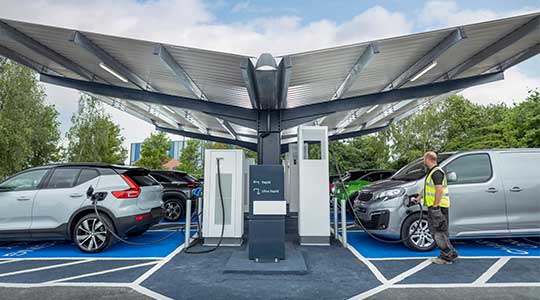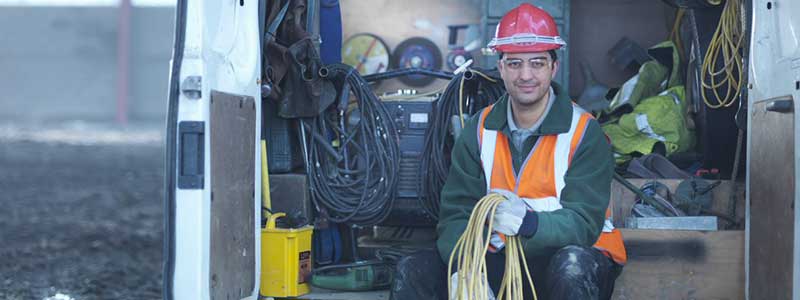Why electricians should do an EV charging qualification
From electrical vehicle charging point installation to design, these new qualifications are meeting the demands of the industry.
27 April 2023

With the government’s 2035 zero-emission vehicle mandate and 2050 net zero goal looming, the need for electric vehicles (EVs) is growing. To meet the demand, improving EV charging infrastructure needs to be a priority for the government and for the electrical sector for the next 10 years.
“If we had a recognised qualification we could refer to, as soon as I saw that on a CV I would be very interested in that person because I know that they know the regulations and they know the EV field.”
– Craig McDermott, Connected Kerb
To make this possible, the skills gap that currently exists will need to be closed. City & Guilds has been working with both employers and some of the key industry bodies to develop qualifications aligned with new industry standards. With quality and safety at their core, they are designed to upskill electricians, engineers and installers to meet the demands of this growing industry.
Check out five reasons that electric vehicle charging installation skills should be a priority.
-
Increasing demand for electric vehicle charging points (EVCPs)
After some initial resistance, consumers and businesses are starting to embrace EVs, with more than 10 million new passenger plug-in electric cars registered globally in 2022.
This is good news for the UK government’s proposed plans for all new cars and vehicles to be zero emission by 2035. In order to meet the zero-emission vehicle mandate, by 2035 all new cars sold will need to be fully electric.
But progress is still being held back by insufficient infrastructure – according to research from the Society of Motor Manufacturers and Traders (SMMT), there was only one charge point installed for every 53 cars sold in 2022. Figures shared by the Department for Transport at the beginning of 2023 also highlighted the amount of work that needs to be done for the government to meet its 2030 target of installing 300,000 chargers across the UK. As of January 1, there were 37,055 public electric vehicle charging devices installed. This is Money calculated that to stay on track, monthly installations would need to increase by 288%.
By failing to keep up with the growing demand, barriers to sustainability are being created rather than torn down and opportunities for business growth in the electrical sector are being missed.
-
Opportunities for electricians
To support drivers charging an EV, the government introduced a new £20 million industry pilot scheme last August, aiming to deliver more than 1,000 electric vehicle charge points across nine areas. This has since been followed up by the announcement of a further £56 million of funding, dedicated to installing 2,400 EVCPs in several areas including Cumbria and Norfolk, a project which will require a significant workforce of upskilled electricians and electrical installers.
This push from the government has not gone unnoticed in the industry.
In our 2022 survey of UK-based electricians – from sole proprietors to large-scale public sector organisations – we found over 70% of businesses were interested in installing EVCPs at some stage in the future, with more than half saying they wanted to start within six months.
It’s clear that electricians see the value that EVCP installation capabilities could offer to their business at a time when the demand seems to be rising almost exponentially.

-
Business growth through green diversification
The landscape of electrical work is changing faster than ever before with new priorities emerging as governments, businesses and consumers demand greener energy. Current areas of work may change significantly – or even disappear entirely – and offering a wider range of services could help businesses stand out amongst competition more focused on traditional electro-tech skills.
Pivoting to green technologies will be vital in the future as solar photovoltaic systems, battery storage and of course electric vehicle charging all become more commonplace. There will never be a better time for electricians to build on their current knowledge, experience and abilities and upskill in preparation for the inevitable green shift.
-
Build confidence in safe, robust and efficient installation
In answer to a further question in our 2022 survey, 88% of the qualified EVCP installers we spoke to said they had low confidence in non-qualified electrical installers’ ability to install larger-scale super-fast charge points correctly.
As the industry continues to grow, ensuring robust and safe installation is going to come under increasing scrutiny.
During a roundtable last year with a number of electric vehicle experts, Paul Nichols, CTO at ubitricity identified one of the clear safety challenges of EV charge point installations, explaining: “There’s only a couple of millimetres of plastic between our customers and that amount of energy, so it is a heightened risk - there’s no new risk, it’s fire and electrocution... but there’s more chance of getting it wrong because there’s more dimensions at play.”
Luke Osborne of the Electrical Contractors' Association (ECA) shared similar views of the importance of safety and consistency for installations: “Even though in most circumstances it’s just a straightforward radio circuit, there are specific nuances when it comes to electric vehicle charge points, so it’s really important that they understand these particulars.”
With these challenges in mind, specific, industry-led training will be crucial to ensuring that electricians and electrical installers can keep up with a fast-evolving industry.

-
Benefits of a qualification backed by experts and employers in the industry
Our EV charging qualifications were developed with industry experts to ensure that anyone who attains them has demonstrated the capability to install EVCPs safely. It’s a stamp of approval that helps certified people stand out from the crowd – something that will be crucial both for home installations and the public EVCP infrastructure-backed government initiatives or private investment.
Craig McDermott, the Installation Manager for charging point producers Connected Kerb Ltd, spoke during the EV roundtable about the appeal of qualifications from a hiring perspective: “Safety comes first, safety is always first at Connected Kerb. If we had a recognised qualification we could refer to, as soon as I saw that on a CV I would be very interested in that person because I know that they know the regulations and they know the EV field.”
All three City & Guilds EV charging qualifications have been approved by the Electrotechnical Certification Scheme (ECS). This enables gold card members to showcase their EV charging installation qualification, listed on their card, to prospective employers or when advertising to customers.
Take the first step to safer installation
Operators in the electrical sector will play a pivotal role in building the EV charging infrastructure and enabling equitable access to EVCPs across the UK. From converting petrol stations into EV charging hubs, to upgrading residential streets and car parks, to helping consumers create their green homes with domestic EV charging points, the skills of electricians and electrical installers will be at the heart of our evolution to a green economy and society.
An industry-recognised qualification could prepare you to take up a position at the heart of the green evolution.
The City & Guilds industry-standard consists of three qualifications which are aimed at existing electricians, engineers and electrical installers and have all been created with safety as a core principle:
- 2921-31 Design and installation of domestic and small commercial electric vehicle charging installations.
- 2921-32 Design and Quality Assurance of Largescale electric vehicle charging installations.
- 2921-33 Installation and maintenance of Largescale electric vehicle charging installations.
Find a City & Guilds approved centre which offers our 2921 EV charging qualification today